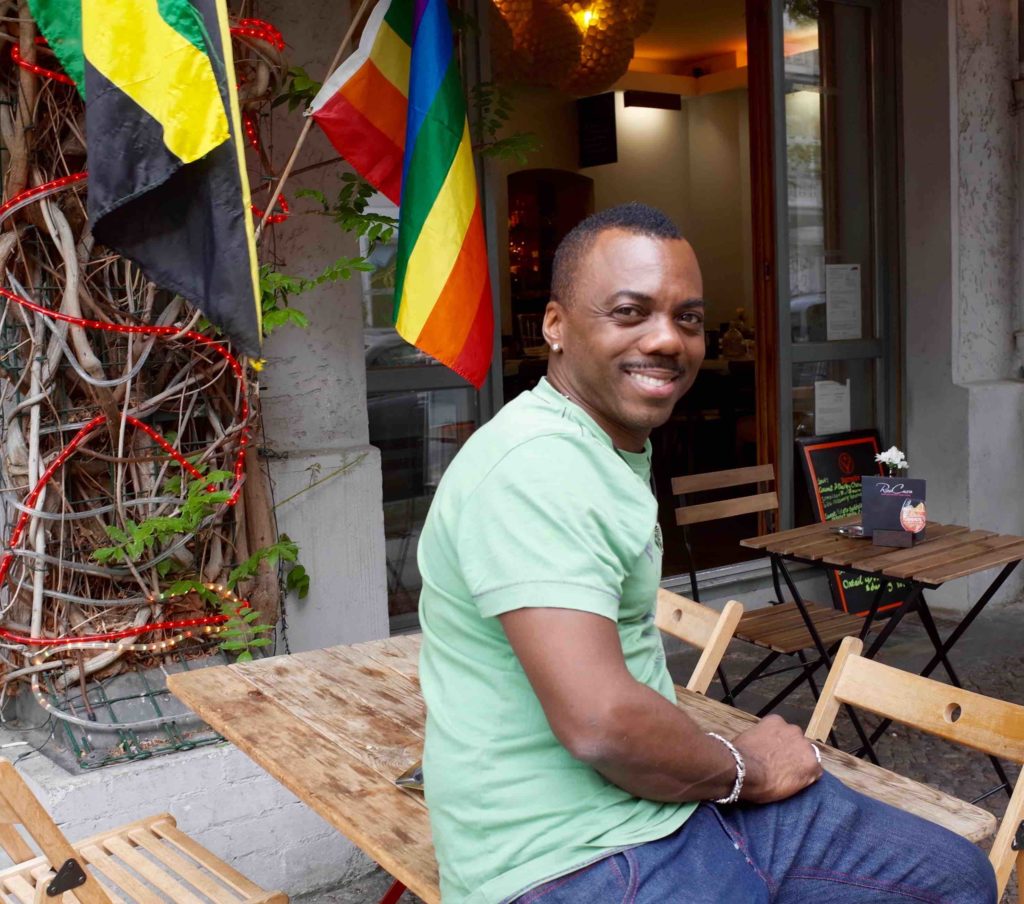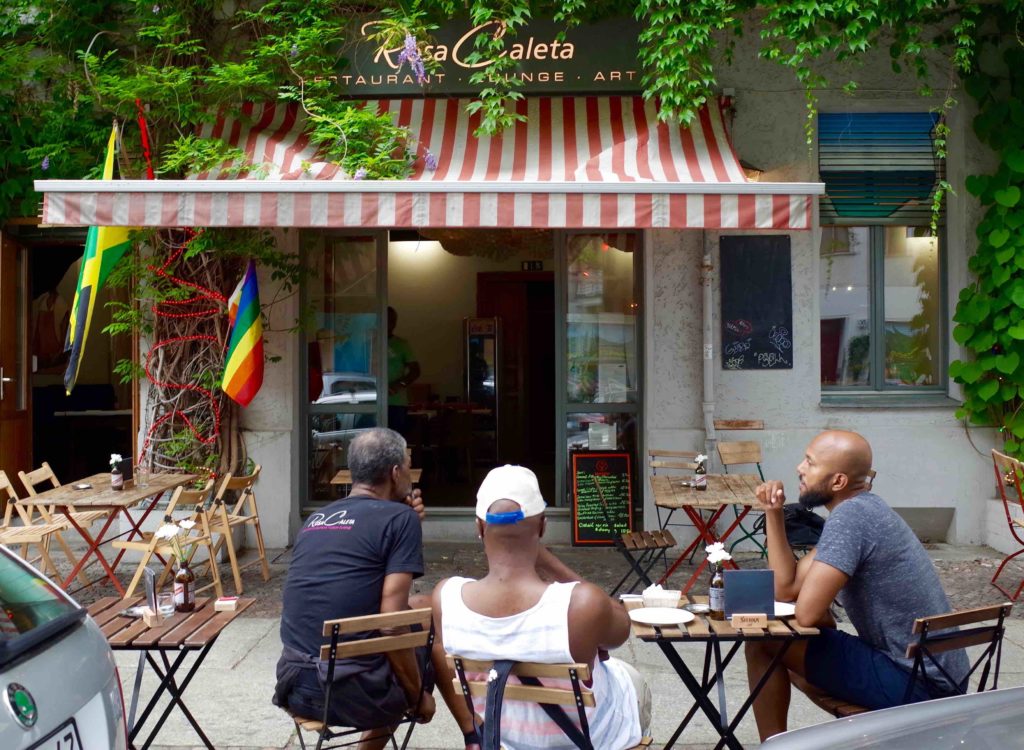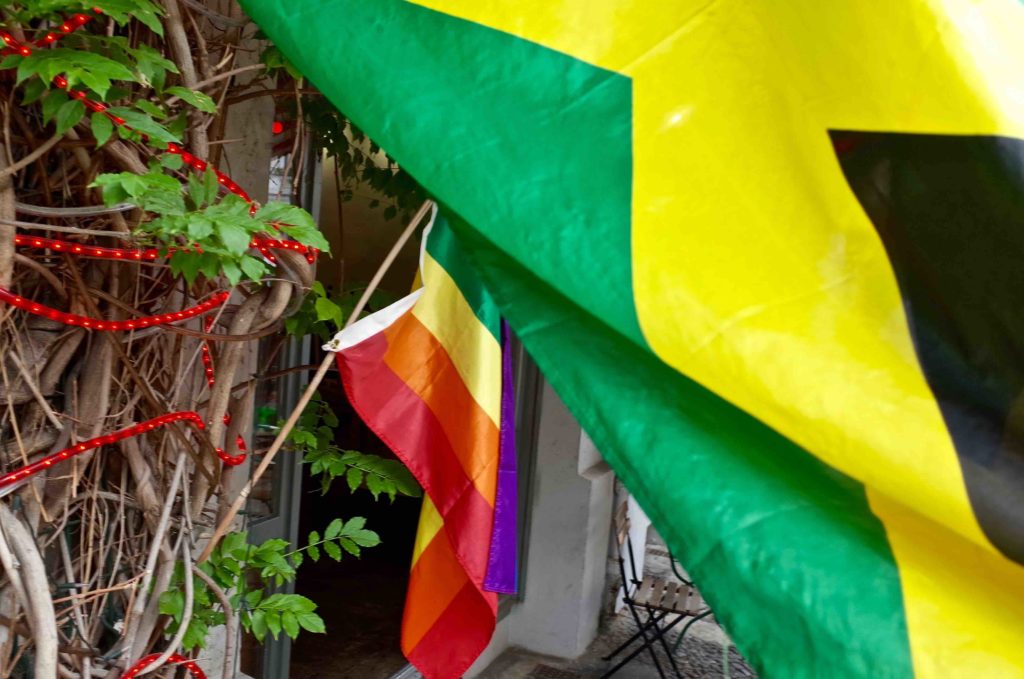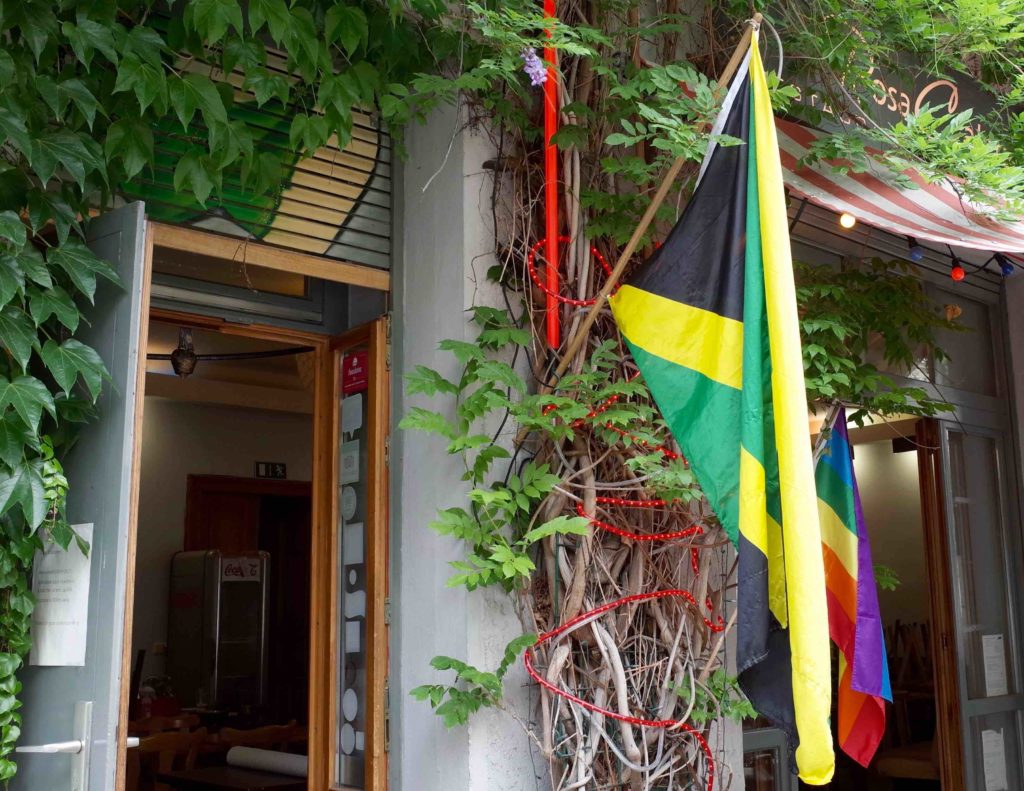RosaCaleta: Jamaica’s Gay Embassy in Berlin
Kirk Henry was out one day in Berlin and met two gay guys who told him they wouldn’t think to go into the restaurant where he works, because it has a Jamaican flag.
Jamaica, of course, has the reputation for being one of the most homophobic places in the world: something one hears in the lyrics of Jamaican dancehall and reggae, reads in laws that punish sexual acts between men with ten-year jail sentences, or sees in the news reports regarding widespread violence against LGBTI persons.
‘You’re gay and you work in that place?’ the guys asked Jamaican-born Kirk, astonished.
The next day, Kirk––who actually owns RosaCaleta restaurant in Kreuzberg–– went straight out and bought a rainbow flag to put up next to the Jamaican one.
‘Make no mistake, gay people are more than welcome in this restaurant!’ he tells me, as we sit outside on the terrace, a Red Stripe beer in my hand. ‘It was a shock to me, really a shock, that the Jamaican flag might be a deterrant’.
Certainly the rainbow flag sends a striking and immediately message alongside the Jamaican one. And I must admit it was what first enticed me inside the restaurant one day, walking down Muskauer Straße.
‘The flags fly separately, they are two separate entities operating as one’, Kirk tells me, ‘Three or four years ago, somebody spray-painted “battyman” [a pejorative Jamaican word for gay, or “faggot”] on the wall of our business. Then a neighbour came and sprayed over it in pink, and was so upset. But I said: let it stay, to show that even in Berlin bullshit like this happens’.
The perception of LGBTI violence in Jamaica and the reality are different as Kirk tells me. ‘Of course, Jamaica is a very conservative and so homophobic society… but there are lots of lots of gay Jamaicans. They are living, existing there and even going out with partners in public. 10 years ago you wouldn’t see that. Now people are out and doing their thing in Jamaica’.
‘You just need to know the codes’, he explains, ‘There are certain places where you can do certain things, and others where it’s not smart. In other countries you need to watch out too. I don’t want to soften the blow about Jamaica, it’s very homophobic. But knowing the codes helped me on several occasions’.
‘Could you give me an example?’ I ask.

‘Yes, I was downtown, a few years ago, in Kingston, not a nice neighbourhood, I had no business there, and I was wearing regular basketball shorts, sunglasses, a loose tanktop, baseball cap. Anywhere else it would be regular summer outfit. But here people started looking. They smelled “foreign”. They said, “jmmmmmmm”. That’s how it starts. I was waiting for a bus, and there was a guy, a street vendor, and he looked me up and down, and he was watching me. The more he started watching me, the more I was concerned with my bus showing up’.
‘Finally, he had to say something: “you look like a little girl”. I turned around and I looked at him, and said to him, in raw Jamaican, “A so deh gyal dem weh you fuck look like?” [So, the girls that you fuck look like me?]. Normally––this is how homophobia works in Jamaica––it’s a pack of dogs phenomenon. One person says: “battyman”, and then everyone asks “who? where? beat him!” This is how it happens. But in that moment, my reply took him so much by surprise, that he started to stutter. The vendor next to him said, “serves you right, leave the boy alone”. And that just changed the whole atmosphere’.
‘If I hadn’t had the wit to say something’, he shrugs, ‘I would have had to RUN. Damn straight. He would have then sounded that alarm. This is how it is. When you are uptown, you can put on your “batty rider” (daisy dukes / skimpy shorts) and it’s not really a big problem. People might talk, but they won’t beat you up. You turn around and slice them, honey. They don’t dare come for you. And that’s true in my whole upbrinring. I never had any incident at all that was aggressive against me. And people thought I was gay. Me and my two best friends were the “fagland possy” in Jamaica until I moved to New York when I was 16′.
‘I’m known in Jamaica in my circle: whether they know I’m gay or not, I don’t care. They shouldn’t be shocked at this point. Of course, one of the attractions of Berlin is the freedom to just exist, to be who you are, to walk down the streets however you want to, even more than in the US. I love that nobody cares— I’m a live and let live kind of guy’.
‘Is that why you came to Berlin? For that freedom?’ I ask him.
‘No, the main reason I came here––from New York––was to do business’.
Kirk had known his now business partner and cook, Troy Lopez, a long time––for 20 years now–– and Troy was living in Berlin and introduced Kirk to the city.
‘I was coming here a lot to visit, but I didn’t imagine living here. It was really cold in the winter, especially in those days. Too cold. But after years of coming here, I decided: it was inexpensive, you have the freedom to live and be, for a first-world capital and city there’s so much development to be done. I said: I will come here and do some business. Between 2003 and 2005, I did reconnaisance. I was here in the summer of 2006. And at the Club der Visionaere, the sun was coming up, it was summer, 5am, but it was so bright I was wearing sunglasses. I was with good friends, chatting and laughing, and in that moment, I heard the Spanish and French, all those languages. For years you have been talking about business in Berlin, if you don’t set this up now, you will miss window of opportunity to be a forerunner. I really felt that, and decided in that moment to come here’.
Originally, the idea of RosaCaleta was a performance and food space, but the performance element was scaled back, the art became a backdrop (especially the big painting of a woman, the eponymous ‘RosaCaleta’, on the wall, which is the symbol of the restaurant), and working with food took priority.
‘One, Jamaican food was new here, and the food was good’, Kirk tells me. The recent development of the neighbourhood around the Markthalle IX has since been very good for business, with many more people on the streets on Market days and events like Stadt Land Food.
‘Tell me about the cuisine’, I ask.
‘The food is what Troy brings to RosaCaleta. It comes from years of experience, of cooking at home, and in restaurants. It’s about experimenting, about satisfying. People sense home cooking in the food we provide: this comes from the idea of cooking for yourself, or for friends. It’s about how you consider who your customer is: the mindset that we could be cooking for friends’.
‘Are there dishes you are proud of?’
‘Two come to mind immediately. Fiery Guava Jerk Chicken is the first. One of the reasons it’s so amazing is that it’s spicy but you get so much flavour. A lot of people are worried it’s too hot, but then they come back and say it was really good. There’s a first assault, but then somehow the flavours come through and trump the hot. The other dish is spicy roasted pork. In Jamaica, there is jerk pork––I love pork––and when I would come here to Berlin as a tourist, Troy would always ask me, what do you want to eat. And, I’d reply, “the pork, honey”. So, we experimented making the spicy roasted pork, with a slab marinated overnight, a hint of spice, I loved the flavour. The sides complimented: we had some cornbread stuffing left over once after Thanksgiving. We tried it. And, bob’s your uncle. So that’s what it’s served with’.
The project too was, of course, very… pink. Pink logo on the restaurant, the name ‘Rosa’. Many of the waiters are very handsome men in tank tops. I’m drinking now a really excellent cocktail called ‘In the Pink’––a Tequila martini with strawberry and lime––as I interview Kirk. He explains, ‘We went begging the whole gay thing. But although we have a high gay presence: it’s not the first thing you see. The core part of our being is our food’.
I don’t think it is too much to say that RosaCaleta has become something of a Jamaican gay Embassy in Berlin. I come here on a Friday evening and there’s the usual mix of neighbourhood locals and hipsters, but also a large Afro-Carribbean presence, not all of whom (I know for a fact) are gay. RosaCaleta has created a space for openness to sexuality, for multiculturalism––it is in a humble way a statement. Not just about what Jamaica can be, but also what Berlin can be (see my last post). Kirk, Troy, and their restaurant is making a contribution to the city that goes well beyond its very good food.
That said, don’t forget to try the Fried Chicken.
RosaCaleta restaurant is located on Muskauer Str. 9, Kreuzberg, Berlin. Tel: 0049 (0) 30/695 37 859.




4 thoughts on “RosaCaleta: Jamaica’s Gay Embassy in Berlin”